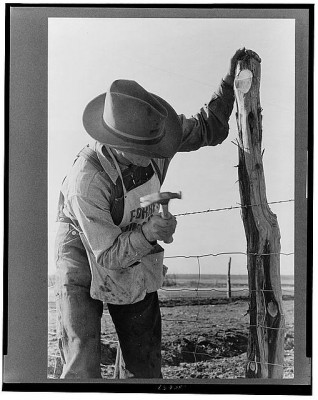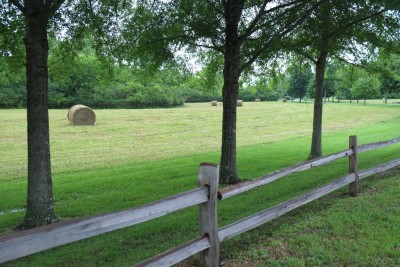“Don’t fence me in.”
Americans love freedom. Actually, I think almost everybody loves freedom. Even dictators love freedom for themselves even if they don’t love it for other people.
One symbol of freedom in the Old West was the open range where cattle could roam freely. However, farmers who raised crops needed fences to keep those cattle out of their fields. The problem was that the environment of the open range of the Old West had very little wood or stone to use to make fences. That all changed in 1873 at a county fair in DeKalb County, Illinois. On display was some barbed wire that local farmer Henry Rose had made to control a particularly troublesome cow. His invention wasn’t unique in the history of the world, as other people at other times had made similar devices.
What made Rose’s display at the DeKalb County Fair important is what three of the local men who saw his invention did after they saw it. They all began to try to make better barbed wire. Two of the men, Joseph Glidden and Isaac Ellwood, eventually formed a partnership; and the third man, Jacob Haish became their competitor. Glidden and Ellwood started one barbed wire factory in DeKalb County, and Haish started another one. Both businesses were successful in producing barbed wire and the practice of building barbed wire fences spread to the open range of the Old West.

However, the taming of the open range did not come without a fight. First, those who opposed fences simply cut them down. Later, the two sides battled one another.
In 1934 Cole Porter wrote a song that expressed the feelings of those who longed for the open range. Many popular twentieth century entertainers recorded the song, including Roy Rogers, Gene Autry, the Andrews Sisters, Bing Crosby, Ella Fitzgerald, Willie Nelson, and Cole Porter himself.
In the song a cowboy begs for lots of land under starry skies so that he can ride through open country and enjoy evening breezes. The cowboy declares: “I can’t stand fences. Don’t fence me in . . .”
As I sat down to write to you last night, I looked through some photos that I have taken recently. Last Thursday Mother and I drove through the countryside to the home of my blueberry lady so I could stock my freezer for next year. Fog was rising near the river, so I drove into the park to take some pictures. When I went through my pictures last night and saw this one, words from “Don’t Fence Me In” came to mind and inspired this post.

I encourage you to embrace the sentiment of the song as you homeschool your children. I agree with the cowboy: “I can’t stand fences (for me or for you homeschooling mamas). Don’t fence me in . . . (and don’t let folks fence you in either). You have one time to be the mama of children at home. Cherish it and live it prayerfully without rules imposed on you by other folks.
It was for freedom that Christ set us free;
therefore keep standing firm
and do not be subject again to a yoke of slavery.
Galatians 5:1
Note: Information for this post was gleaned from “The Rise of Barbed Wire and Its Transformation of the American Frontier,” American Studies at the University of Virginia.

